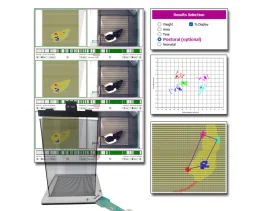Authors
G. Hussain, F. Schmitt, A. Henriques, T. Lequeu, F. Rene et al.
Lab
Université de Strasbourg, Strasbourg, France
Journal
PLOS One
Abstract
The progressive deterioration of the neuromuscular axis is typically observed in degenerative conditions of the lower motor neurons, such as amyotrophic lateral sclerosis (ALS). Neurodegeneration in this disease is associated with systemic metabolic perturbations, including hypermetabolism and dyslipidemia. Our previous gene profiling studies on ALS muscle revealed down-regulation of delta-9 desaturase, or SCD1, which is the rate-limiting enzyme in the synthesis of monounsaturated fatty acids. Interestingly, knocking out SCD1 gene is known to induce hypermetabolism and stimulate fatty acid beta-oxidation. Here we investigated whether SCD1 deficiency can affect muscle function and its restoration in response to injury. The genetic ablation of SCD1 was not detrimental per se to muscle function. On the contrary, muscles in SCD1 knockout mice shifted toward a more oxidative metabolism, and enhanced the expression of synaptic genes. Repressing SCD1 expression or reducing SCD-dependent enzymatic activity accelerated the recovery of muscle function after inducing sciatic nerve crush. Overall, these findings provide evidence for a new role of SCD1 in modulating the restorative potential of skeletal muscles.
BIOSEB Instruments Used
Grip strength test (BIO-GS3)
Source :
http://www.plosone.org/article/info%3Adoi%2F10.1371%2Fjournal.pone.0064525

 Douleur - Allodynie/Hyperalgésie Thermique
Douleur - Allodynie/Hyperalgésie Thermique Douleur - Spontanée - Déficit de Posture
Douleur - Spontanée - Déficit de Posture Douleur - Allodynie/Hyperalgésie Mécanique
Douleur - Allodynie/Hyperalgésie Mécanique Apprentissage/Mémoire - Attention - Addiction
Apprentissage/Mémoire - Attention - Addiction Physiologie & Recherche Respiratoire
Physiologie & Recherche Respiratoire




































 Douleur
Douleur Système Nerveux Central (SNC)
Système Nerveux Central (SNC)  Neurodégénérescence
Neurodégénérescence Système sensoriel
Système sensoriel Système moteur
Système moteur Troubles de l'humeur
Troubles de l'humeur Autres pathologies
Autres pathologies Système musculaire
Système musculaire Articulations
Articulations Métabolisme
Métabolisme Thématiques transversales
Thématiques transversales Congrès & Meetings
Congrès & Meetings 